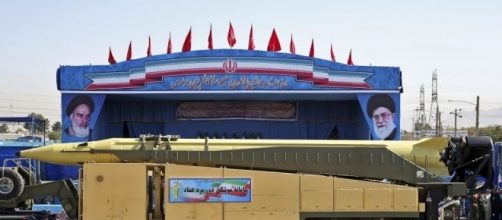Last week the new U.S. government lashed back at iran’s provocative measures and testing a medium-range ballistic missile, slapping a new round of sanctions against Iran. On the other hand, senior Trump administration officials and leading members of Congress also criticized the Obama administration’s policy of appeasement vis-à-vis Iran.
In the course of eight years the Obama White House allowed Iran pursue its aggressive policy in the region and continue its atrocious record of human rights violations. The Obama administration chose to neglect all of the mullahs’ confrontational actions for the sake of preserving the Iran nuclear deal.
The appeasement policy not only failed to contain Iran, in fact, it paved the path for more intensified Iranian meddling across the Middle East. The lethal nature of Iran’s involvement in Syria, Iraq and Yemen, and continuing to enhance its ballistic missile program parallel to a slate of test launches are all the result of this policy.
Right approach for Iran
23 former senior U.S. government officials from both sides of the aisle signed a hand-delivered letter to the then President-elect Donald Trump on January 9th saying:
“Through their extremely high rate of executions at home, and destructive sectarian warfare in support of the Assad regime in Syria and proxy Shiite militias in Iraq, Iran’s rulers have directly targeted US strategic interests, policies and principles, and those of our allies and friends in the Middle East.
The fast and firm reaction shown by Team Trump in regards to Iran’s ballistic missile tests, in line with the positions taken by senior government officials and members of Congress during the past few weeks, are all indications of shifting policies on Iran.
These signs have raised fear in the Iranian regime on one hand, and anger amongst the mullahs’ international supporters and the West’s pro-appeasement camp. This can be vividly seen in the articles written these days by such advocates in mainstream Western media.
Such writers are attempting to depict an image as if any change in Washington’s Tehran policy is against U.S. interests. They have resorted to the known tactic of deception employed by Iran: any pressure on Tehran and a shift in policy will provoke the mullahs and lead to war.
In line with such efforts, this front continuously parrots the lies dictated by Iran’s Ministry of Intelligence aimed at discrediting and demonizing Iran’s main democratic opposition, being the People’s Mojahedin Organization of Iran (PMOI/MEK) and their long slate of international supporters.
Now the question is why are the Iranian regime’s lobbies and its supporters in the West once again resorting to repeating the Iranian intelligence’s lies and allegations against the MEK? What interest do they have in demonizing the Iranian opposition?
The answer is simple. Signs of changing tides in U.S. foreign policy in regards to Iran are vivid, and this has caused major concerns among Iran’s lobbyists and supporters.
Iran's Achilles Heel
One such action is to build on the new sanctions imposed by the Trump administration on Iran, and the Iranian opposition welcomed such a measure. The next step is to sanction and blacklist Iran’s Revolutionary Guards (IRGC) as a foreign terrorist organization, a measure currently under consideration by the Trump White House.
Considering the IRGC’s leading role in Iran’s nuclear program, ballistic missile drive, foreign military intervention and domestic crackdown, this is a measure Iran will understand loud and clear, and has the potential of acting as a silver-bullet since the IRGC controls a large stake of the mullahs’ economy.
Iran’s lobbies and advocates in the West have chosen the first option.
To this end, instead of targeting the Iranian regime, they have focused their demonizing effort against the Iranian opposition. This is a continuation of the Obama administration’s failed policy and will in fact only further encourage the mullahs to continue their belligerence.

